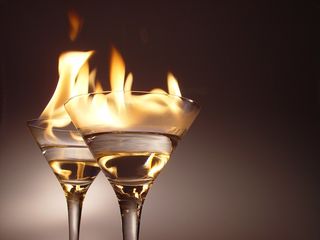Alcoholism
Can Psychedelic Experiences Cure Alcohol Addiction?
A new study hints at a novel and promising treatment for alcohol use disorder.
Posted May 21, 2019

Alcohol dependence is a major societal issue. Approximately 28% of American adults currently exhibit unhealthy alcohol consumption patterns, according to the National Institute on Alcohol Abuse and Alcoholism.
Although various therapeutic and pharmacological treatments have been developed to help people with alcohol addiction, in most cases, they fail to achieve a long-term reduction or cessation in patients' drinking. For instance, research suggests that while behavioral therapy combined with FDA-approved pharmacotherapies (e.g., acamprosate, naltrexone, or disulfiram) can temporarily reduce excessive drinking, approximately 70% of patients relapse after the first year of treatment.
But there might be hope on the horizon for chronic sufferers of alcohol use disorder. Researchers at Johns Hopkins University and the Erowid Center explored the effects of psychedelics on heavy alcohol users. Interestingly, they found significant and long-term reductions in alcohol use following psychedelic experiences.
To come to this conclusion, the researchers conducted an hour-long web survey. Using various online recruitment channels, the researchers invited individuals to participate who had overcome alcohol addiction after using psychedelics. Participants qualified for the study if they were 18 or older, fluent in the English language, met the diagnostic criteria for alcohol use disorder, and had "used psychedelics outside of a university or medical setting, followed by reduction or cessation of subsequent alcohol use."
343 participants met the qualifications laid out by the researchers and successfully completed the online survey. In the survey, participants were asked to report their prior and current alcohol use and to provide details regarding their psychedelic experience—such as substance used, dose, setting, and behavioral effects. Respondents, on average, indicated that they had been dealing with an alcohol problem for seven years and that they had not received prior treatment for alcohol addiction.
Regarding their psychedelic experience, most participants reported using either LSD or psilocybin (mushrooms). While doses varied, the majority of respondents reported using a moderate amount of the drug. And, most study participants indicated that it had been at least a year since their psychedelic experience.
Critical to the researchers' hypothesis, only 10% of respondents indicated that they initially used the psychedelic as a way to reduce their alcohol consumption. More than a quarter of participants, however, reported that the psychedelic experience contributed to a "change in values or life priorities, which [...] helped change their alcohol use." Some participants noted that the psychedelic experience changed their orientation toward the future such that the long-term benefits of abstinence outweighed immediate desires. Others cited an increased belief in their ability to abstain from alcohol use following the psychedelic experience.
One participant commented that the psychedelic experience “allowed me to feel whole again and forced me to reconnect with emotional trauma. It gave me insight into the nature of addiction and how it enslaves us—physically, mentally, and spiritually. Addiction numbs us to any kind of growth as a human being.”
Overall, almost all study participants indicated a significant reduction in alcohol consumption after the psychedelic experience—reducing consumption from approximately 26 to four drinks per week. In fact, 83% of participants failed to meet the clinical threshold for alcohol use disorder following the psychedelic experience. Not only did the psychedelic experience significantly curb people's drinking, but it also appeared to stave off relapse years after the psychedelic experience.
Benefits notwithstanding, it is important to keep in mind that this study cannot claim a cause-and-effect relationship between hallucinogens and reduced alcohol use due to the self-selected sample and the observational nature of the research. However, it is another signal that psychedelics may have wide-ranging pharmacological applications that scientists are only beginning to understand. Let's hope the dialogue continues.
References
Garcia-Romeu, A., Davis, A. K., Erowid, F., Erowid, E., Griffiths, R. R., & Johnson, M. W. (2019). Cessation and reduction in alcohol consumption and misuse after psychedelic use. Journal of Psychopharmacology, 0269881119845793.


